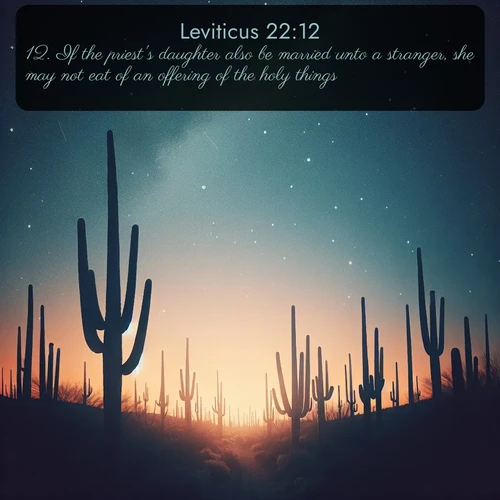Leviticus 22:12 plusieurs versions / traductions
English Bible Translations
12. If the priest's daughter also be married unto a stranger, she may not eat of an offering of the holy things.
12. And if a priest's daughter be married unto a stranger, she shall not eat of the heave-offering of the holy things.
12. And if the daughter of a priest is married to an outside person she may not take of the holy things which are lifted up as offerings.
12. And a priest's daughter who is [married] to a stranger may not eat of the heave-offering of the holy things.
12. If the priest's daughter also shall be married to a stranger, she may not eat of an offering of the holy things.
12. `And a priest's daughter, when she is a strange man's, -- she, of the heave-offering of the holy things doth not eat;
German Bible Translations
12. Wenn aber des Priesters Tochter eines Fremden Weib wird, die soll nicht von der heiligen Hebe essen.
12. Wenn aber des Priesters Tochter eines Fremdlings Weib wird, soll sie nicht von dem Hebopfer des Heiligen essen.
French Bible Translations
12. »La fille d'un prêtre mariée à un étranger ne mangera pas de ce qui est prélevé sur les offrandes saintes.
12. La fille d’un sacrificateur, mariée à un étranger, ne mangera point des choses saintes offertes par élévation.
12. La fille d'un sacrificateur, mariée à un étranger, ne mangera point des choses saintes offertes par élévation.
12. Et une fille de sacrificateur, si elle est mariée à un étranger, ne mangera pas des offrandes élevées des choses saintes.
12. Que si la fille du Sacrificateur est mariée à un étranger, elle ne mangera point des choses saintes, présentées en offrande élevée.
12. Si une fille de sacrificateur est mariée à un étranger, elle ne mangera point des choses consacrées, offertes par élévation.
Versions with Strong Codes
Leviticus 22 / KJV_Strong12. If[H3588] the priest's[H3548] daughter[H1323] also be[H1961] married unto a stranger,[H376] [H2114] she[H1931] may not[H3808] eat[H398] of an offering[H8641] of the holy things.[H6944]
Strong Code definitions
H3588 kiy kee a primitive particle (the full form of the prepositional prefix) indicating causal relations of all kinds, antecedentor consequent; (by implication) very widely used as a relative conjunction or adverb (as below); often largely modified by other particles annexed:--and, + (forasmuch, inasmuch, where-)as, assured(-ly), + but, certainly, doubtless, + else, even, + except, for, how, (because, in, so, than) that, + nevertheless, now, rightly, seeing, since, surely, then, therefore, + (al- )though, + till, truly, + until, when,whether, while, whom, yea, yet.
H3548 kohen ko-hane' active participle of H3547; literally, one officiating, a priest; also (by courtesy) an acting priest (although a layman):--chief ruler, X own, priest, prince, principal officer.see H3547
H1323 bath bath from H1129 (as feminine of H1121); a daughter (used in the same wide sense as other terms of relationship, literally and figuratively):--apple (of the eye), branch, company, daughter, X first, X old, + owl, town, village.see H1129 see H1121
H1961 hayah haw-yaw a primitive root (compare 1933); to exist, i.e. be or become, come to pass (always emphatic, and not a mere copula or auxiliary):--beacon, X altogether, be(-come), accomplished, committed, like), break, cause, come (to pass), do, faint, fall, + follow, happen, X have, last, pertain, quit(one-)self, require, X use. see H1933
H376 'iysh eesh contracted for H582 (or perhaps rather from an unused root meaning to be extant); a man as an individual or a male person; often used as an adjunct to a more definite term (and in such cases frequently not expressed intranslation):--also, another, any (man), a certain, + champion, consent, each, every (one), fellow, (foot-,husband-)man, (good-, great, mighty) man, he, high (degree), him (that is), husband, man(-kind), + none, one, people, person, + steward, what (man) soever, whoso(-ever), worthy. Compare 802.see H582 see H802
H2114 zuwr zoor a primitive root; to turn aside (especially for lodging); hence to be a foreigner, strange, profane; specifically (active participle) to commit adultery:--(come from) another(man, place), fanner, go away, (e-)strange(-r, thing, woman).
H1931 huw' hoo of which the feminine (beyond the Pentateuch) is hiyw {he}; a primitive word, the third person pronoun singular, he (she or it); only expressed when emphatic or without a verb; also (intensively) self, or (especially with the article) the same; sometimes (as demonstrative) this or that; occasionally (instead of copula) as or are:--he, as for her, him(-self),it, the same, she (herself), such, that (...it), these, they, this, those, which (is), who.
H3808 lo' lo or lowi {lo}; or loh (Deut. 3:11) {lo}; a primitive particle; not (the simple or abs. negation); by implication, no; often used with other particles (as follows):--X before, + or else, ere, + except, ig(-norant), much, less, nay, neither, never, no((-ne), -r, (-thing)), (X as though...,(can-), for) not (out of), of nought, otherwise, out of, + surely, + as truly as, + of a truth, + verily, for want, + whether, without.
H398 'akal aw-kal' a primitive root; to eat (literally or figuratively):--X at all, burn up, consume, devour(-er, up), dine, eat(-er, up),feed (with), food, X freely, X in...wise(-deed, plenty), (lay) meat, X quite.
H8641 truwmah ter-oo-maw' or trumah (Deut. 12:11) {ter-oo-maw'}; from H7311; a present (as offered up), especially in sacrifice or as tribute:--gift, heave offering ((shoulder)), oblation, offered(-ing). see H7311
H6944 qodesh ko'-desh from H6942; a sacred place or thing; rarely abstract, sanctity:--consecrated (thing), dedicated (thing), hallowed (thing), holiness, (X most) holy (X day, portion, thing), saint, sanctuary.see H6942
Prédications qui analysent les thèmes Lévitique 22
Thèmes : Holiness of Offerings; Acceptable SacrificesRelated Sermons discussing Leviticus 22
Themes : Holiness of Offerings; Acceptable Sacrificessee also: Bible Key Verses ; KJV Bible Images, BBE Bible images

